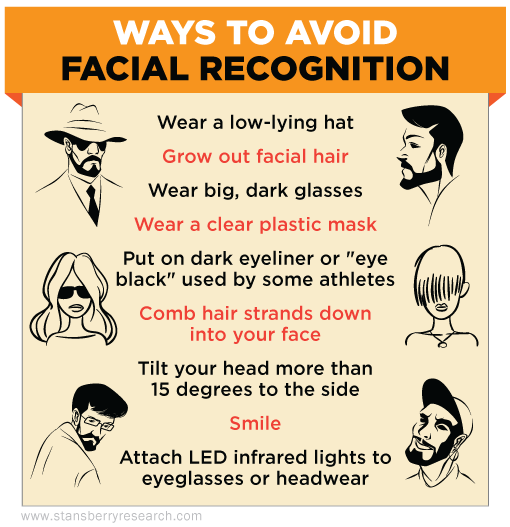You're likely part of a criminal lineup...
Even if you've never set foot in a police station... been suspected of a crime... or had your mug shot taken... The cops may be keeping your photo on file.
A basic right of every American citizen is to refuse to participate in any sort of lineup. But more and more of us no longer have that option.
A new report from Georgetown Law's Center on Privacy and Technology shows that one out of every two Americans is in a police face-recognition database.
You read that right... 50% of us have our photos in a police-controlled database. As the authors explain...
This summer, the Government Accountability Office revealed that close to 64 million Americans do not have a say in the matter: 16 states let the FBI use face recognition technology to compare the faces of suspected criminals to their driver's license and ID photos, creating a virtual lineup of their state residents. In this lineup, it's not a human that points to the suspect – it's an algorithm.
Perhaps you trust what your "public servants" in government are doing with your private data... And proponents of the databases say that facial recognition can help law enforcement.
But a mountain of data on every citizen presents an enticing target for all who would harm you.
These huge databases are largely made up of innocent folks – according to the report, 80% of the photos in the FBI's network are of people without any criminal history.
Some complain that extreme uses, such as real-time surveillance using the database as a comparison, violate the Fourth Amendment – your protection against unreasonable searches and seizures by the government.
For example, during the Baltimore riots last year, police scanned faces in the protest crowd and matched them in real time against the facial database. They used it to "monitor" the situation.
That kind of surveillance makes us uneasy. And adding to that mistrust of what Big Brother is doing with all of this info is the fact that many agencies lack any kind of oversight or regulation regarding the use of these databases.
For example, some states, like Alabama and Tennessee, only allow the FBI to run facial-recognition searches. Other states, like Ohio and Florida, allow hundreds of state agencies to run these searches.
You can't get yourself out of a database. For many of us, the necessity of having a driver's license puts us in the database whether we like it or not. But you can know and understand exactly who can use your face in a search and how.
There are three things to do...
1) First, understand what's going on in your state. You can find your state on the interactive map, here. Make sure you understand exactly who can see your face in the database and look into instances of misuse. Also look for the last audit on the database procedures. Maryland, for instance, has not conducted an audit since the system launched in 2011.
2) Second, write to your representatives. Point them to this report and urge them to regulate these databases and protect our privacy. You can look up how to get in touch with your state officials as well as your senators and representatives right here. Refer them to the Wiretap Act as a guideline for how to protect our privacy.
3) Finally, guard your privacy when it comes to real-time facial recognition. Even if you're already in one database, these steps can help keep the government from putting you in another one...
Facial-recognition technology measures the distance between features like the eyes, nose, and mouth. And we're not talking about just a few key points... Most programs compare around 45,000 unique points on the face. The average system then cross-checks this biometric data with the profiles of 13 million other faces... all in the blink of an eye.
Most people make the task of facial recognition even easier... They flood the web with their pictures. Social media websites like (the aptly named) Facebook and LinkedIn are chock-full of "mug shots."
If you want more privacy, there is a solution...
The technology is not foolproof. But here are some ways to thwart facial recognition:
Now, some of these techniques will attract quite a bit of attention. They may even single you out for closer scrutiny. But on second glance, many of these techniques are more innocuous than they appear...
Some of these techniques try to cover up facial features. Beards and dark glasses do this without garnering extra attention. Other techniques attempt to distort the distances between measured facial points. A smiling face is markedly different from a deadpan facial structure. This is why we're told not to smile when taking ID photos.
I think the most ingenious technique of all is to utilize infrared lights. One nine-volt battery can power these for days on end. The bulbs are pea-sized and emit no visual light... but to a facial-recognition camera, bright streams of infrared light will cloud out a person's face.
Protecting privacy is important to us here at Retirement Millionaire Daily. It's so important, we want you to read our full section on privacy in my book, The Big Book of Retirement Secrets. In it, I share more tips for safeguarding your family's privacy as well as hundreds of other tips on health and wealth. To get your copy, simply click here.
What We're Reading...
- Read more about the report's findings right here.
- Facebook's own version of facial recognition.
- Something different: Bermuda Triangle's mystery solved? Not quite.
Here's to our health, wealth, and a great retirement,
Dr. David Eifrig and the Retirement Millionaire Daily Research Team
Baltimore, Maryland
October 27, 2016

